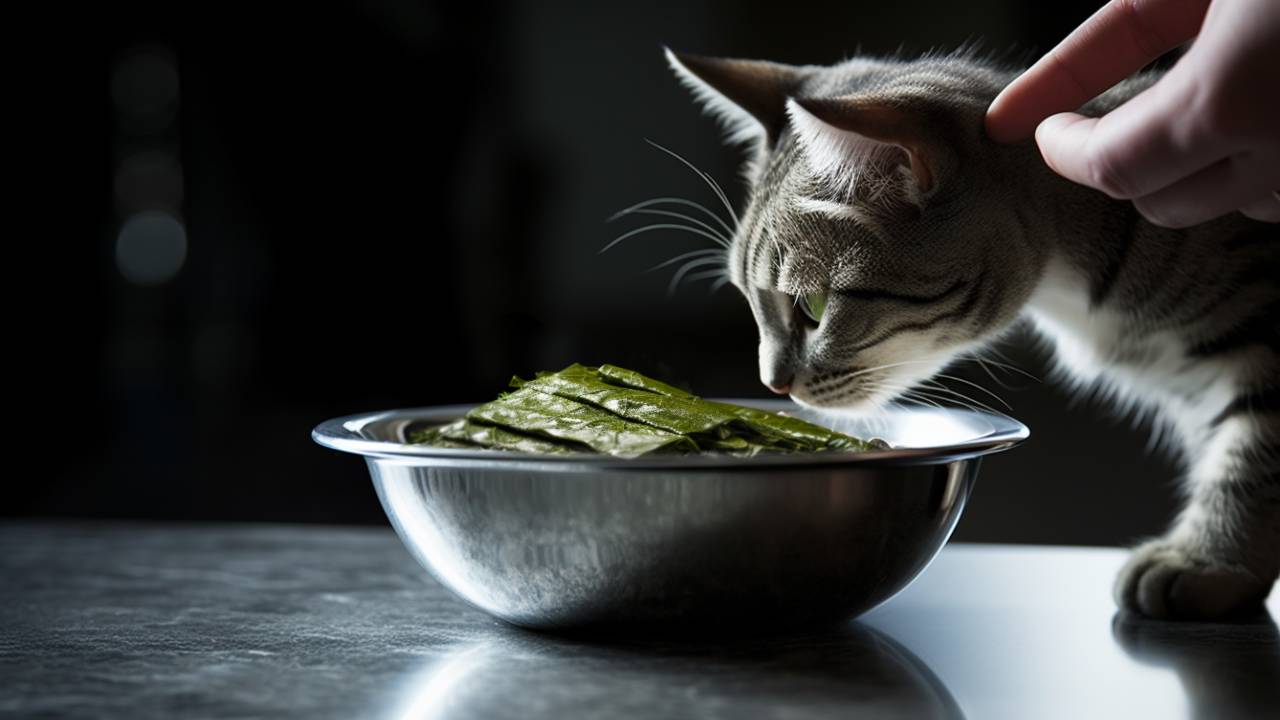We’re living in a time where superfoods are becoming more mainstream. Among these, one particularly slimy star shines brightly: seaweed.
While many of us are incorporating these oceanic plants into our diet, a curious question arises: Can cats eat seaweed? Today, we’ll dive deep into this topic, examining whether seaweed is safe for our feline friends and how much they can consume.
What’s in Seaweed?
Before we answer the pressing question – is seaweed safe for cats – let’s understand what this marine vegetable contains. Seaweed is known to be a powerhouse of nutrients. It contains vitamins like A, C, E, and B.
Moreover, it’s a great source of minerals such as iodine, calcium, iron, and magnesium. Some people even tout its benefits for improving digestion and supporting thyroid function.
Can Cats Eat Seaweed?
You’ll be delighted to know that, yes, in moderation, seaweed can be safe for cats! But, as with anything else, there are nuances. Just as not all fish from the sea are suitable for every person, not every type of seaweed is suitable for every cat.
Seaweed is often incorporated in many high-quality cat foods because of its beneficial nutritional profile. Some cat treats even use seaweed extracts for added health benefits.
Types of Seaweed and Cats
Before you race to the kitchen to share a seaweed snack with Mr. Whiskers, remember that not all seaweeds are created equal.
Nori
Do you know those sheets used to roll sushi? That’s Nori. It’s often the safest form of seaweed for cats, as it’s low in sodium and doesn’t usually contain added spices.
Kelp
While kelp is rich in nutrients, it also has high iodine levels. This can be beneficial in regulated amounts, but too much can disrupt a cat’s thyroid function.
Wakame and Dulse
These types of seaweed are also generally safe. However, it’s best to offer them in moderation, ensuring they’re free from added seasonings and salts.

Potential Dangers of Seaweed for Cats
So, how safe is it to give your cat seaweed? While seaweed itself isn’t toxic, there are potential dangers associated with feeding it to cats:
- Seasonings and Salts: Many packaged seaweed snacks for humans are loaded with salt, spices, and other seasonings. Excessive salt can be harmful to cats, causing sodium ion poisoning.
- Choking Hazard: If you’re giving your cat dried seaweed, it can sometimes form clumps when mixed with saliva. This is a choking hazard, especially if your cat gobbles down treats.
- Overconsumption: Like us, cats can have too much of a good thing. Overeating seaweed can lead to an iodine overdose, which affects the thyroid.
How Much Seaweed Can a Cat Eat?
Now to the all-important question: How much is too much? If you’re introducing seaweed to your feline’s diet, start slow. Begin with small, bite-sized pieces, preferably of nori, and monitor your cat for adverse reactions.
For an average-sized cat, a small piece every other day or a few times a week is more than enough. Remember, it’s meant to be a treat, not a meal replacement.
To sum it up, cats can enjoy the benefits of seaweed, but it’s crucial to offer it in moderation and to be mindful of the type you’re giving. It’s always best to consult a veterinarian before introducing new foods into your pet’s diet.
The next time you’re enjoying a sushi roll, don’t feel too guilty if you want to share a small piece of plain nori with your purring friend. After all, sharing is caring. Just ensure you’re giving them something that not only tantalizes their taste buds but is also safe for their delicate systems.

FAQs
Can kittens eat seaweed just like adult cats?
While kittens can eat seaweed, it’s crucial to offer even smaller portions than you would to an adult cat, always under the supervision of a vet.
What if my cat accidentally eats spicy seaweed snacks?
If your cat consumes a small amount, monitor them for signs of distress. If they show discomfort or odd behavior, consult your vet immediately.
How can I introduce seaweed to a fussy cat?
Start by sprinkling tiny bits of seaweed onto their favorite food. Over time, they might develop a liking for it.
Is fresh seaweed better than dried for cats?
Both are okay, but dried seaweed can sometimes clump in a cat’s mouth. If offering fresh, ensure it’s clean and free from contaminants.
Are there seaweed cat treats available in the market?
Some manufacturers produce seaweed-based treats or supplements designed specifically for feline dietary needs.
Can seaweed cause allergies in cats?
While uncommon, any new food can cause an allergic reaction. Stop immediately and consult your vet if you notice itching, swelling, or digestive distress after feeding seaweed.
Will seaweed help with my cat’s digestive issues?
Seaweed has been known to support digestion in humans, but its effects on cats have yet to be extensively studied. Always discuss dietary changes with your vet, especially for health concerns.






Seaweed is a surprising topic! Never thought about it for cats. Has anyone ever tried giving their feline friend seaweed treats? 🌿😺